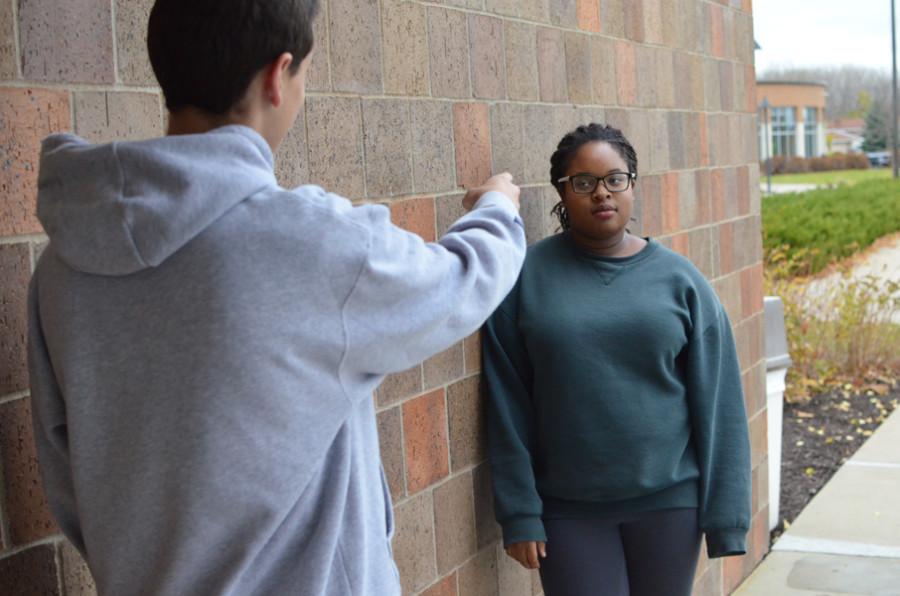Stop calling me “baby”
The idea that catcalling is flirting needs to end.
I was only nine years old when I was catcalled for the first time.
It was my first year of Girl Scouts, and I was ecstatic to be selling cookies outside Walmart. All nine of us Scouts pranced around our table asking shoppers to buy Thin Mints and Caramel deLites as our troop leader supervised.
Business was slow, so a fellow Scout and I thought that if we brought more attention to ourselves, people might be willing to buy some boxes. We began lifting boxes above our heads and spinning around like ballerinas. Every five minutes, we’d come up with silly chants and cheers.
However, instead of attracting customers, we attracted unwanted attention.
An older man, probably between the ages of 40 and 50, walked past me and nodded his head. “Looking good, cutie. Wanna come dance for daddy?”
I didn’t understand what he was implying because I was only nine years old. However, I knew enough that I should not take his comment as a compliment. I immediately ran to the troop leader and notified her about the man. From that day on, a policeman supervised our selling.
My experiences with catcalling never improved. As I went through puberty, men continued to harass me, whether it was on the street, at work, or in the worst cases, at school.
Yes, catcallers roam what are supposed to be safe hallways and harass other students. Sometimes they’ll follow girls until they stop to talk to them or corner a student while on their way to class. When I played volleyball, they waited in the Lindbergh Center to comment on my uniform and how I looked in Spandex.
Catcalling is not flattering. The act can range from simply saying a vulgar comment to a man or woman to following them for a couple of blocks.
It’s a dangerous method of interaction that, in some scenarios, will escalate because victims can’t respond to their oppressor because they aren’t sure of what catcaller are capable of. Catcalling also allows a man or woman to have power over your body by controlling your emotions. In most cases, this involves eliciting fear.
According to a survey conducted by Cornell University in 2015, 67 percent of women in the United States experienced catcalling by the age of 14. The number increased to 85 percent by the age of 17. In the past year, 77 percent of women reported being followed home by a man that has made them feel unsafe.
And it’s not always women who are the victims of street harassment.
In an experiment done by YouTube prankster, Coby Persin, a camera followed a young man around New York City to see if men really got catcalled just as much as women. In just three hours the man was verbally harassed over thirty times. Women followed the man asking for his number, others commenting on his appearance and following him down the block.
I dream about a time when men and women will be allowed to walk the streets at night without worrying about a stranger following them home and calling out vulgar suggestions and remarks. However, if my dream is to be achieved, a few things need to be taken care of.
First, we need to stop seeing people as objects, but as human beings.
We were not placed on Earth for other’s enjoyment. Every person has a purpose. Whether it’s to become a businessman or woman, a teacher, or a mother or father, we have a calling. Too often, we conform to images people perceive us as. We’re more than what others think we are.
Second, we need to respect an individual’s choice.
It’s a pitiful excuse to catcall men and women because of their outfit choice. “Her skirt was so short,” “he was shirtless,” and the notorious “they were asking for it,” need to stop being used. An individual makes their own choices, and it’s your responsibility to respect them.
Lastly, the idea that catcalling is flirting needs to end.
It isn’t flattering for a stranger to comment on my body. I feel uncomfortable even if friends or family comment on my body. If I’m not okay with their comments, what makes you think I’m okay with you doing it?
To all the men and women who catcall, there are other ways to catch a stranger’s attention. Smiling, saying hello, and something as simple as opening the door can brighten anyone’s day.
And if that isn’t enough for you, then kindly shut your mouth as we cross paths.



